By Awan Achiek
South Sudan’s economy will continue to suffer shocks heading in 2022 amid high levels of poverty and food insecurity at household levels, warned the World Bank in it’s latest economic analysis report.
It reveals that food insecurity is expected to worsen going forward due to rise this year in the number of displaced people amid decline in food production and also the already disrupted distribution systems and markets.
It says that most households will face limited access to a variety of food types as a result of limited diversity and poor quality of food, adding that acute malnutrition will be widespread.
After decades of independence, South Sudan’s economy grew with Gross Domestic Product (GDP) estimated at 8.5 percent in 2019-2020.
GDP growth in 2020-2021 is projected to contract by -4.5 percent largely due to shocks caused by falling oil prices in the global market.
The report predicts that South Sudan’s economy will recover from 2021-2022 and beyond if the government eradicates poverty and food insecurity.
It also cautions the government to intensify efforts to address the underlying cause of conflict and to restore peace and stability to provide a strong basis for economic recovery and sustainable growth.
It adds that the government should maintain a commitment to economic and public finance management reforms to stabilize the economy.
Abraham Matoc, Vice-Chancellor of Dr. John Garang Memorial University of Science and Technology said the report is based on the assessment of the exact situation existing on the ground.
“The economy is not productive and is not creating jobs and there are no investment to create industries. Small and large businesses are not performing well,” Matoc told The Juba Echo in Juba on Sunday.
He explained that the economy is affected because the country is not producing its own food.
“Economy is not static it is in fact changing every time it’s declining since there is no production,” he added.
Matoc noted that the economy will recover if peace and security prevails in the country.
South Sudan is struggling to recover from years of conflict that broke out in December 2013.
A revitalized peace agreement signed in 2018 by the parties is yet to be fully implemented with key tasks like the security arrangement that includes unification of the army still to be concluded.







